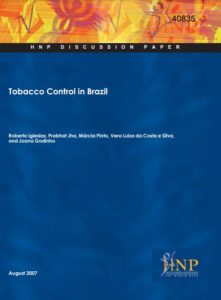
The objective of this study was to assess the smoking situation in Brazil, and the role of the tobacco control program, and compare it to experience in other countries. The study assessed key trends in smoking rates and lung cancer in Brazil and reviewed price and non-price interventions. A discussion of fiscal instruments and smuggling is also included in this report. This study aimed at further evaluating the smoking situation in Brazil, the role of the tobacco control program in the country, and compares it to global best practices and experience in other countries. The study report is structured into three main parts: in the first chapter, trends in smoking prevalence, consumption, and cigarette expenditures in Brazil are reviewed, including the illegal market; in the second chapter, trends in lung cancer mortality and health care costs of smoking-related diseases in the country are analyzed; in the third chapter, non-price and price interventions are reviewed, including those taken by the Brazil tobacco control program, as well as the impact increases in cigarette prices and taxes would have on smoking prevalence and tax revenue. The report concludes with recommendations for further action to protect the Brazilian population from premature death and disease caused by smoking and to reverse the negative impact of smoking on public expenditures.
To read the full document with the source link, please click here.
World Bank
World Bank

